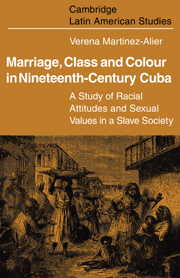 Marriage, Class and Colour in Nineteenth Century Cuba
Marriage, Class and Colour in Nineteenth Century Cuba Published online by Cambridge University Press: 09 October 2009
This acute preoccupation with individual and family honour is by no means restricted to nineteenth-century Cuba. These are values which seem to have played a central role not only in Spain but also in other European countries before the nineteenth century. Contemporary literature gives evidence of this. Unfortunately, few attempts have so far been made at a systematic sociological study of these concepts. It is only recently that a few anthropologists working in the Mediterranean area have endeavoured to reach an understanding of the concepts of honour and shame in terms of the social order in which they prevailed. Before attempting to draw some parallels between nineteenth-century Cuba and these Mediterranean societies, and suggesting a more general explanation, a short review of these studies is necessary.
HONOUR IN THE MEDITERRANEAN
I shall concern myself mainly with Campbell's, Pitt-Rivers' and Lisón's studies, and in them specifically with the female aspect of honour. While being well aware of distinctions between these communities and nineteenth-century Cuba, there are nevertheless certain parallels which seem to make such an analytical comparison worthwhile.
J. K. Campbell, in his study of the Sarakatsani, a Greek shepherd community, aims at explaining the resolution of the conflict between their conceptualization and implementation of honour on the one hand, and their religious ideals on the other. Sarakatsani hold two systems of values: one social, which prescribes as a paramount duty of all men the defence of family prestige vis-à-vis all other families, the result being a permanent competition for honour; and one religious, which espouses the brotherhood of all men before God.
To save this book to your Kindle, first ensure [email protected] is added to your Approved Personal Document E-mail List under your Personal Document Settings on the Manage Your Content and Devices page of your Amazon account. Then enter the ‘name’ part of your Kindle email address below. Find out more about saving to your Kindle.
Note you can select to save to either the @free.kindle.com or @kindle.com variations. ‘@free.kindle.com’ emails are free but can only be saved to your device when it is connected to wi-fi. ‘@kindle.com’ emails can be delivered even when you are not connected to wi-fi, but note that service fees apply.
Find out more about the Kindle Personal Document Service.
To save content items to your account, please confirm that you agree to abide by our usage policies. If this is the first time you use this feature, you will be asked to authorise Cambridge Core to connect with your account. Find out more about saving content to Dropbox.
To save content items to your account, please confirm that you agree to abide by our usage policies. If this is the first time you use this feature, you will be asked to authorise Cambridge Core to connect with your account. Find out more about saving content to Google Drive.